For moms in recovery, these home visitors offer a lifeline
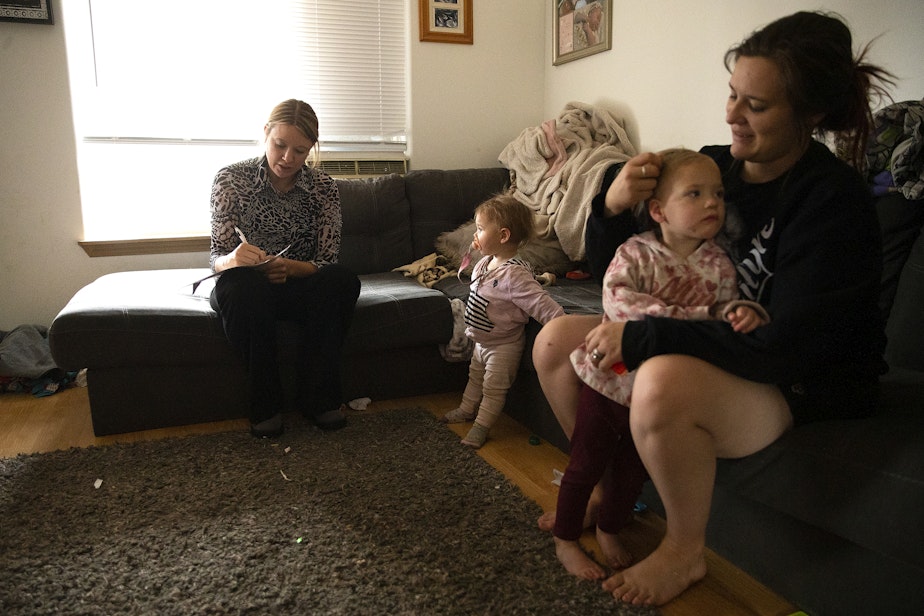
Toni Gardner is the type of person who will set up a lawn chair outside the hotel room of someone with a drug addiction, then wait for hours for a foot in the door to connect. People who’ve been on the other side of those doors call her “Wonder Woman,” “a boss” and “one of the best.”
The pandemic left a lot of vacancies in Gardner’s line of work, at a time when the need is great.
Her job is to build connections with moms who are in addiction and often homeless, then stay alongside them for years as they piece their families back together. Her title is lead case manager. What she would rather call herself — and each of these moms — is a "change-maker."
“Because by the end of the three years, most of them are ready to fly,” Gardner said. “A lot of them have learned so many skills that they could be me, and a lot of them do come back and we do hire them because they have that lived experience.”
Sponsored
Gardner is with Sound Pathways, a social service nonprofit in Everett, where she works with new and pregnant moms enrolled in the state-funded Parent-Child Assistance Program. It’s one of several voluntary home visiting programs in Washington that offer long-term support to families with a range of complex needs, including parents who are in their teens, homeless, or struggling with substance abuse. Home visitors help connect the parents to resources for housing, early childhood education, mental health care, or other services. Research shows this early parent support can have lifelong benefits for a child's mental health, among other outcomes.
For a typical day of visits, Gardner stocks her car with a few baby items, energy bars and snacks for long days, an extra change of clothes for herself, drug reversal medication, plastic gloves, and other supplies.
“We just keep showing up,” Gardner said. “And the clients keep showing up and some of them are just alone. That’s our community, right? What happens if we don’t support them?”
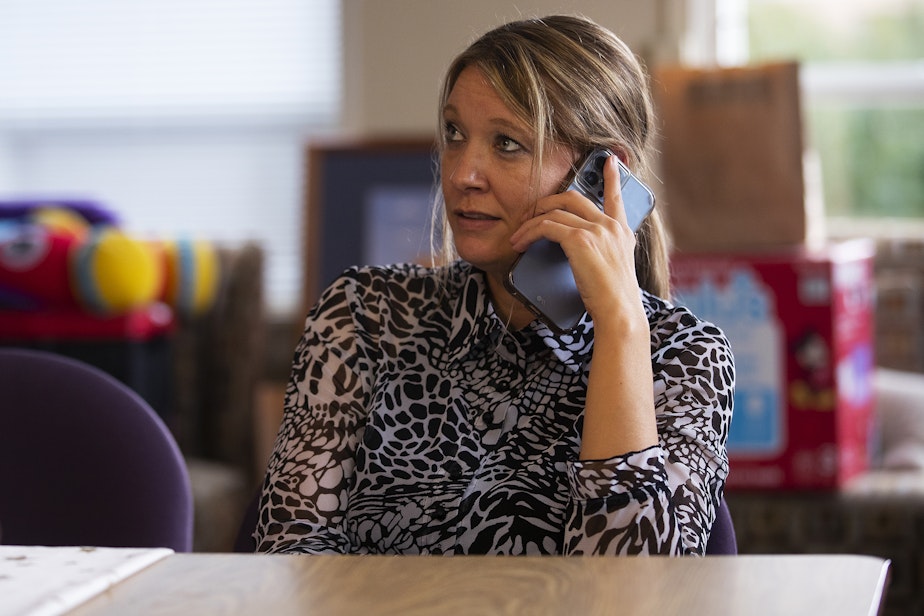
Next year, home visiting advocates are making a big push to the legislature to bolster their workforce and expand capacity across Washington. The pandemic left a sizeable wake through the system, including a higher than normal turnover for home visitors like Toni Gardner, according to a recent report from the state’s Home Visiting Advisory Committee. The report noted that “wages are a morale and retention issue,” and referenced a 2019 report that showed 23% of home visitors in the Pacific Northwest region receive some type of public assistance.
Sponsored
RELATED: KUOW's three-part series, "Swimming Upstream"
- Part 1: A family’s mental health journey out of crisis
- Part 2: Breaking a cycle of generational trauma
- Part 3: A family’s newfound resolve is tested — again
For the state’s next two-year budget, the Department of Children, Youth, and Families has requested more than $15 million in additional funding for home visitor programs, which agency spokesperson Jason Wettstein called “a different magnitude” of investment to support and provide professional development for this workforce.
“A lot of people do get burned out in this work,” Gardner said. “They get really exhausted and emotionally tied into it.”
In Gardner’s office last year, for example, the staff was down four of their eight case workers at one point, leaving dozens of clients in limbo.
Sponsored
“I just made sure that I checked in with all of them until we got stable again,” Gardner said. “You do what you have to do. Nobody had workers, you know, and do we just not help people?”
In Gardner’s five years, she’s had two clients die from overdoses. She pushes back tears remembering them.
“That’s hard,” she said. “My boss always says ‘open up your book, your case notes, and look and see everything you did for them.’”
That advice helps Gardner on rough days, but what really keeps her going is easy to see.
“Them,” she said, nodding toward a client’s home she just left. “Watching the successes — I mean, we've had a lot of successes. So every day is a good day, even when it's hard.”
Sponsored
Recently, Gardner brought a new case manager on board and spent a day training her, as they made home visits to moms in Marysville, Arlington, and Everett. We rode along to get a closer view of their work.
These moms are at various stages in the three-year Parent-Child Assistance Program, and have leaned on it in different ways — for help with housing, sobriety, job training, parenting guidance, child custody cases, mental health care, or other needs. We’re sharing a slice of their stories, in their own words, about how they’re navigating a path out of crisis, for themselves and for their children.
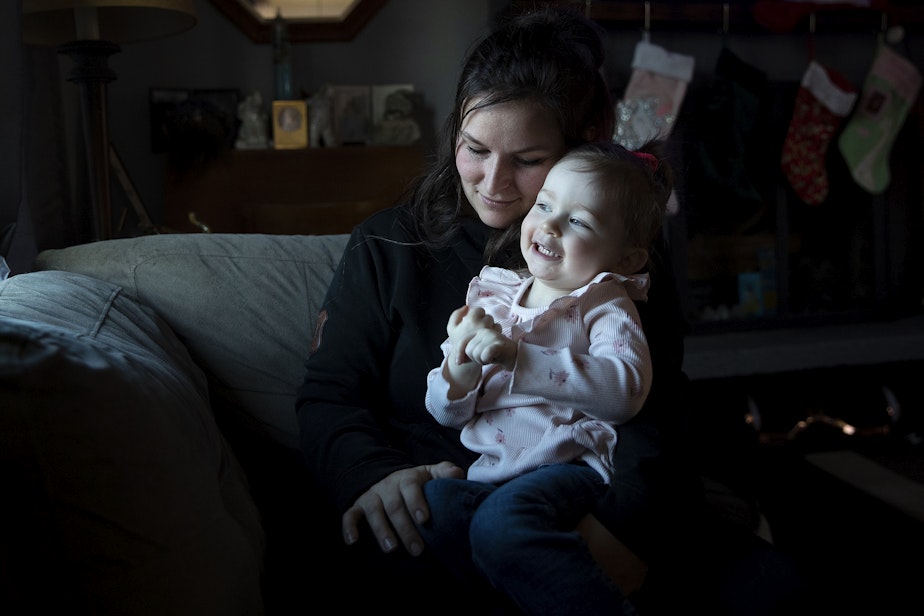
Ferrari Spence, on mental health care and parenting
Sponsored
Ferrari Spence lives with her mom in Marysville. Spence’s daughter Danni, age 2, and Danni’s father DJ also live with them.
Gardner set up lawn chairs in the front driveway for this visit because Spence struggles with anxiety around new people and situations, although it’s improved since she started mental health counseling.
Gardner started off by asking Spence, “What’s going well right now?”
“Pretty much everything. I mean, [Danni] is starting to really blossom into her own personality, like she narrates everything that she does.
I used to take so many pictures of her when she was little, and then there's a period of time where there's no pictures. And that's while I was gone, in active addiction being stupid. It's like you see her crawling, doing tummy time, all that stuff — and then there's no pictures — and then there's pictures of her walking. I missed all of that. It makes me kind of sad thinking about it, but then seeing her here, the way she is now…that's just more of a drive to not miss any more.
DJ is doing really well. He just got another $2 raise. He was the epitome of a Seattle bum drug addict and here he is almost a year later — he's had the same job since February and he's gotten three raises.
Before my active addiction, I had lots of people coming to me for car services. I worked on Subarus and I was building my own business while I was still working. But then I let this take over my life and I lost all of that. I lost all three of my cars, I lost my scooter, I lost my apartment, all three of my jobs.
I was solely [doing] methamphetamine. It was something that turned my brain off.
It just became too much and we chose on our own to go to treatment, and to get away from it. But cleaning up all of the things that I did took a long time. I was not normal for months.
Being able to have support outside your family, someone who doesn't know you but is so invested in your growth and prosperity, it's definitely helped me progress as a sober person, and be happy about it and not complain about things that are messed up, or things that aren't going my way.
I would like to get a part-time job and that’s where a little bit of my pride comes in. It took me a while to be okay with Danni just being my main focus, and to see that I was helping by taking care of her and helping her learn. This is like that core bonding time to really ingrain into her what it means to be a good person, because I do not want her to go down the road that we went.
It’s a generational curse, and I want to break that generational curse so bad.
Before Gardner leaves, she gives Spence some information about a weekly group for moms to talk about trauma and processing.
Driving away, Gardner said it was a big step for Spence to work through her anxiety and open up about her story to new people. It’s something Spence is working toward doing with a sponsor in a sobriety program.
Gardner said much of their time together in the first six months was to build trust and help Spence “get used to hearing her own voice.” She’s beams, realizing how much that voice has emerged. By year two, Gardner said most clients are ready to find work but the first year is about “healing, mental health, and other stuff they need to work on.”
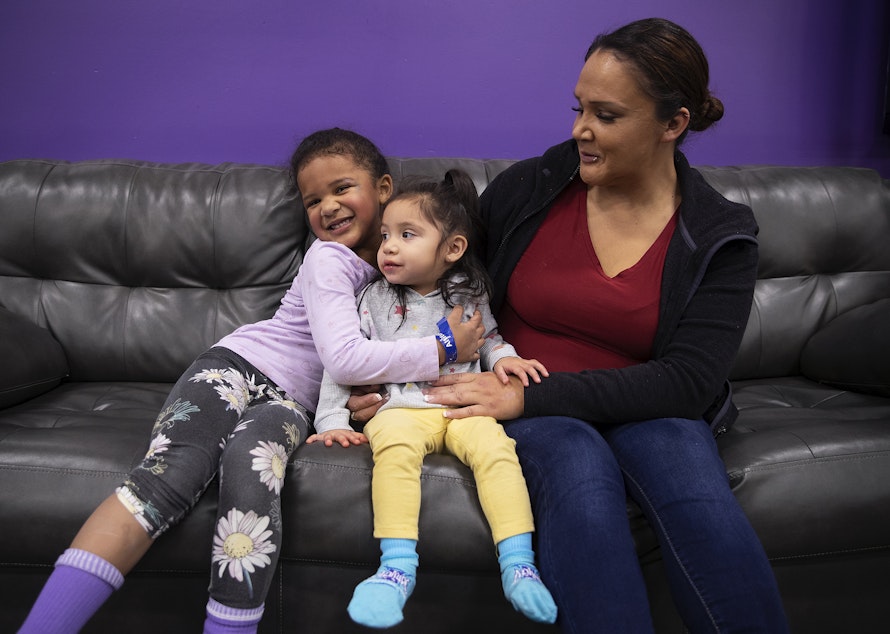
Latasha Bagley, on education and community
LaTasha Bagley lives in Marysville with two of her daughters, while working to rebuild relationships with three of her children who are in foster care.
She’s a member of the Tulalip Tribe and said she eventually wants to pursue family support work in her community. On this visit, she told Gardner that she’s signed up for online education through the tribe but is still looking for a cheap laptop to get started.
Gardner made several calls to local nonprofits but no luck.
One tip she’s learned is to do these calls on speakerphone, with the clients involved, so that they gain the skills to take over and advocate for themselves.
Now nearly two years in recovery and more stable in her personal life, Bagley said she’s ready to reconnect more with her tribe.
“I
just didn't know what to do when I had my son. I asked my family for help but, you know, we were all struggling with our addiction. I just wanted my kids to be safe and I didn't want them to grow up how I did, so I asked [social services] if the baby could go to a safer home until I was better. It took a long time to get better.
I really want to work with my tribe to help families get reunited and just share my story with them on how I did it. The tribe will help us do anything we want with our lives as long as we just maintain our sobriety and have good goals.
Today we're going to go down to my grandma's house, and we're going to drum together. My mom was in a drum group and she’s the one who taught us our songs, so she's going to be our lead drummer. I just want to pass on our tradition to my kids, and show them how to fancy dance and teach them our songs.
I'm going to learn how to sew with my grandma and I want to pass that down with my kids because we’re going to have a gathering...to introduce ourselves to our community as a drum group again. That’s a goal I’m really focused on.”
Driving across Marysville to the next home visit, Gardner points out a few businesses where she’s found good partnerships.
She points to MOD Pizza, where several of her clients have found “second chance” employment. Nearby is a bank that’s helped her staff set up a budgeting class and starter bank accounts for clients. Then, there’s the grocery store where Gardner’s put in many hours working with clients on their food budget.
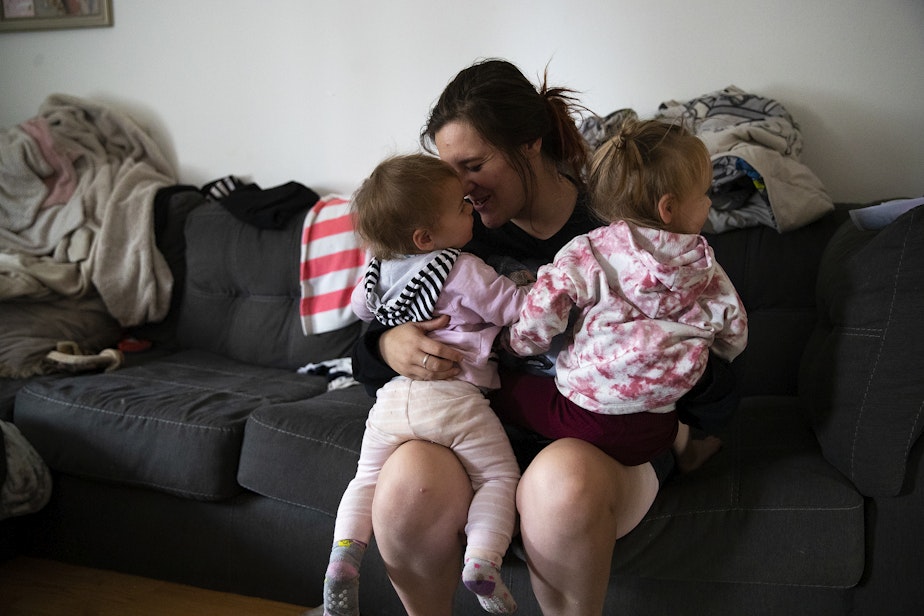
Kierra Fisher, on housing
Two years ago, Kierra Fisher and her husband Jesse were addicted to heroin and mostly living out of a car. Since working with Gardner, Fisher said the ongoing case management and support helped her shift her thinking toward a long-term plan for her whole family.
When Fisher became eligible for a housing voucher last spring, Gardner coached her through the house-hunting during a tight, 90-day window for the voucher. It was an uphill fight to find a landlord willing to take a risk on their background.
“We did like two or three houses a day, while I was working and Jesse was working. We were meeting up at lunch breaks and hurrying up and getting to these houses to check them out. Everywhere we’d go, they’d tell us what we want to hear to our faces and then when we call them back, they’d tell us that they gave it to somebody else.
And Toni was like, ‘You should write a letter, and explain your lives and everything that you've been through and what led you up to get to the place you're at now.’ So I wrote these letters for me and Jesse and the bottom line was, ‘Do you want to be a part of our success story?’
The guy who owns this house, he gave us a chance and he met our kids and our dog. Then he called us like 20 minutes later; we didn't even make it home yet.
I’ll never forget, he said, ‘Nobody's giving you a chance, are they?’ And he said, ‘Yeah, well, I want to be a part of your success story. You got the place. It’s yours.’
I just remember looking at Jesse and I started crying. And he was like, ‘We have to call Toni. She's a boss.’
Honestly, if I didn't have housing, I wouldn't have my kids and I wouldn't be where I am today. I would still be out there.
I did not know how to advocate for myself when I first got into the Parent-Child Assistance Program, and both of my case managers taught me that. Now I teach my clients how to do it.
I love being able to give back to the community that I was once a part of and showing them that they can do something better with themselves. We don't have to be miserable and out there on the streets.
Once I had my job and my housing and my kids and all the things that keep me grounded mentally, I never wanted to go back.
Fisher now works at an inpatient drug treatment facility in Snohomish County, and helps clients with housing before they exit.
Liz Jones reported this story while participating in the Rosalynn Carter Mental Health Journalism Fellowship.




